
The Kennedy family is an American political family that has long been prominent in American politics, public service, entertainment, and business. In 1884, 35 years after the family's arrival from Ireland, Patrick Joseph "P. J." Kennedy became the first Kennedy elected to public office, serving in the Massachusetts state legislature until 1895. There was at least one Kennedy family member in federal elective office from 1947, when P. J. Kennedy's grandson John F. Kennedy became a member of Congress from Massachusetts, until 2011, when Patrick J. Kennedy retired as a member of Congress from Rhode Island.
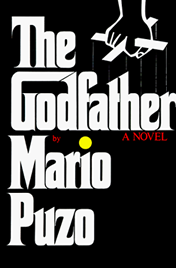
The Godfather is a crime novel by American author Mario Puzo. Originally published in 1969 by G. P. Putnam's Sons, the novel details the story of a fictional Mafia family in New York City, headed by Vito Corleone, the Godfather. The novel covers the years 1945 to 1955 and includes the back story of Vito Corleone from early childhood to adulthood.

Michael Corleone is a fictional character and the main protagonist of Mario Puzo's 1969 novel, The Godfather. In the three Godfather films, directed by Francis Ford Coppola, Michael was portrayed by Al Pacino, for which he was twice-nominated for Academy Awards. Michael is the youngest son of Vito Corleone, a Sicilian immigrant who builds a Mafia empire. Upon his father's death, Michael succeeds him as the don of the Corleone crime family.

The 1964 United States Senate elections coincided with the election of President Lyndon B. Johnson by an overwhelming majority, to a full term. His Democratic Party picked up a net two seats from the Republicans. As of 2021, this is the last time either party has had a two-thirds majority in the Senate, which would have hypothetically allowed the Senate Democrats to override a veto, propose constitutional amendments, convict and expel certain officials, or invoke cloture without any votes from Senate Republicans. In practice, however, internal divisions could have prevented the Democrats from doing so. The Senate election coincided with Democratic gains in the House in the same year.

Vito Corleone is a fictional character in Mario Puzo's 1969 novel The Godfather and in the first two of Francis Ford Coppola's film trilogy. Vito is originally portrayed by Marlon Brando in the 1972 film The Godfather, and later by Oreste Baldini as a boy and by Robert De Niro as a young man in The Godfather Part II (1974). He is an orphaned Sicilian immigrant who builds a Mafia empire.
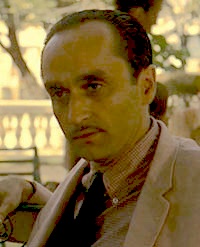
Federico Corleone is a fictional character in Mario Puzo's 1969 novel The Godfather. Fredo is portrayed by American actor John Cazale in the Francis Ford Coppola 1972 film adaptation and in the 1974 sequel, The Godfather Part II.

Santino "Sonny" Corleone is a fictional character in Mario Puzo's 1969 novel The Godfather and its 1972 film adaptation.
The Corleone family are a group of fictional characters in the novels and the films of The Godfather series, created by Mario Puzo and first appearing in his 1969 novel The Godfather. They are an organized crime family originating from the Sicilian town of Corleone, and who are based in New York City.

Thomas Hagen is a fictional character in Mario Puzo's 1969 novel The Godfather and Francis Ford Coppola's films The Godfather (1972) and The Godfather Part II (1974). He is portrayed by Robert Duvall in the films. He also appears in the Mark Winegardner sequel novels, The Godfather Returns and The Godfather's Revenge, as well as Ed Falco's novel, The Family Corleone.

Katherine Corleone is a fictional character in Mario Puzo's 1969 novel The Godfather. She was portrayed by Diane Keaton in Francis Ford Coppola's trilogy of films based on the novel.

The Godfather is a 1972 American crime film directed by Francis Ford Coppola, who co-wrote the screenplay with Mario Puzo, based on Puzo's best-selling 1969 novel of the same name. The film stars Marlon Brando, Al Pacino, James Caan, Richard Castellano, Robert Duvall, Sterling Hayden, John Marley, Richard Conte, and Diane Keaton. It is the first installment in The Godfather trilogy. The story, spanning from 1945 to 1955, chronicles the Corleone family under patriarch Vito Corleone (Brando), focusing on the transformation of his youngest son, Michael Corleone (Pacino), from reluctant family outsider to ruthless mafia boss.
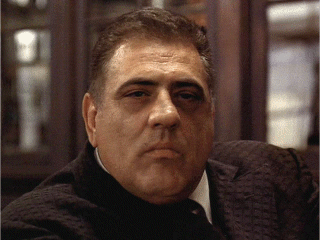
Luca Brasi is a fictional character in Mario Puzo's 1969 novel The Godfather, as well as its 1972 film adaptation. In the film, he was portrayed by Lenny Montana, an ex-wrestler and former bodyguard for the Colombo crime family.
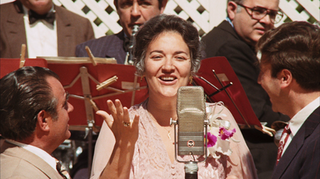
Carmela Corleone (1897–1959) is a fictional character in Mario Puzo's 1969 novel The Godfather. Carmela is portrayed by Italian-American Morgana King in Francis Ford Coppola's 1972 film adaptation of the novel, and in The Godfather Part II (1974).
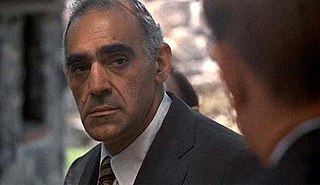
Salvatore "Sal" Tessio is a fictional character in Mario Puzo's 1969 novel The Godfather, as well as two of the films based on it: The Godfather (1972) and The Godfather Part II (1974). His given name was created for the films; in the novel he is referred to only as "Tessio". In the film The Godfather, Tessio was portrayed by Abe Vigoda. In The Godfather Part II, John Aprea portrayed the younger Tessio, while Vigoda reprised the role in a flashback, set in late 1941, at the end of the film.
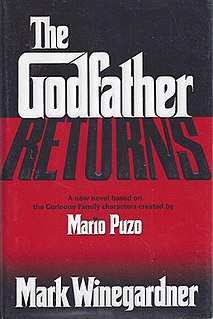
The Godfather Returns is a novel written by author Mark Winegardner, published in 2004. It is the sequel to Mario Puzo's 1969 novel The Godfather and The Sicilian (1984). The publisher, Random House, selected Winegardner to write a sequel after Puzo's death. As the original novel covered the years 1945 to 1955, and included significant backstory on Don Vito Corleone's life, Returns covers the years 1955 to 1962, and includes significant backstory on Michael Corleone's life prior to the first novel. It is the third book in The Godfather series of novels.

The Godfather's Revenge, a 2006 novel written by author Mark Winegardner, is the sequel to his 2004 novel The Godfather Returns. It is the fourth book in The Godfather novel series and is chronologically set last.
Daniel Brendan Shea is a fictional character in Mark Winegardner's novels The Godfather Returns (2004) and The Godfather's Revenge (2006). He is based on Attorney General and US Senator Robert F. Kennedy.
William Brewster Van Arsdale III is a fictional character in Mark Winegardner's 2004 novel The Godfather Returns.
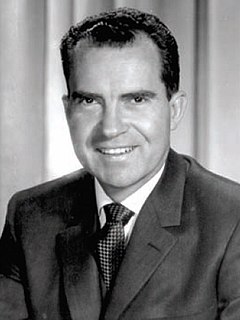
The 1960 United States presidential election in Oregon took place on November 8, 1960, as part of the 1960 United States presidential election. Voters chose six representatives, or electors, to the Electoral College, who voted for president and vice president.















